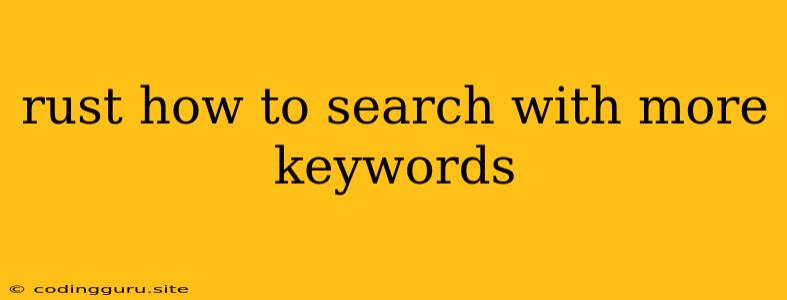Rust: Mastering Multi-Keyword Search
Rust, a powerful and efficient programming language, offers fantastic capabilities for text processing and searching. But how do you effectively search for data when you have multiple keywords to consider? This article will guide you through the process of building a robust multi-keyword search function in Rust.
Understanding the Challenge
Imagine you're building a search engine for a database of books. You want users to be able to search for books using multiple keywords, like "Rust programming" or "web development". The challenge lies in efficiently finding items that match all of the given keywords, not just any one.
Leveraging Rust's Data Structures
Rust's standard library provides us with several tools for crafting efficient keyword searches. Two prominent ones are:
HashMap: A hash map is ideal for storing and retrieving data based on a unique key. In our case, the key could be the individual keywords, and the value could be a list of items containing that keyword.HashSet: A hash set is an efficient way to store unique values. We can use this to store all the items that match all the keywords we are searching for.
The Algorithm
Here's a step-by-step approach to implement a multi-keyword search function:
- Tokenize the Search Query: Break down the user's search query into individual keywords.
- Create a
HashMap: For each keyword, store aHashSetof items that contain that keyword. - Iterate Through Keywords: For each keyword in the search query:
- Retrieve the
HashSetassociated with the keyword. - If this is the first keyword, initialize a new
HashSetto store the initial matching items. - Otherwise, take the intersection of the current
HashSetwith the previously retrievedHashSet. This ensures that items only remain if they contain all keywords processed so far.
- Retrieve the
- Return Results: The final
HashSetwill contain the items that match all the keywords in the search query.
Example: A Simple Keyword Search Function
use std::collections::HashMap;
use std::collections::HashSet;
fn multi_keyword_search(items: &HashMap<&str, Vec<&str>>, search_query: &str) -> HashSet<&str> {
let mut result: HashSet<&str> = HashSet::new();
let keywords: Vec<&str> = search_query.split_whitespace().collect();
for keyword in keywords {
if let Some(matching_items) = items.get(keyword) {
if result.is_empty() {
result = matching_items.iter().cloned().collect();
} else {
result = result.intersection(&matching_items.iter().cloned().collect()).cloned().collect();
}
} else {
return HashSet::new(); // No matches for this keyword
}
}
result
}
fn main() {
let items: HashMap<&str, Vec<&str>> = [
("Rust", vec!["The Rust Programming Language", "Rust Cookbook"]),
("programming", vec!["The Rust Programming Language", "Programming Rust", "Rust Cookbook"]),
("web", vec!["Web Development with Rust"]),
]
.iter()
.cloned()
.collect();
let search_query = "Rust web";
let matches = multi_keyword_search(&items, search_query);
println!("Search query: {}", search_query);
println!("Matches: {:?}", matches);
}
In this example, items stores books and their keywords. The function multi_keyword_search takes a search query and returns a set of books that match all the keywords.
Optimizing Performance
- Indexing: For large datasets, pre-computing an index that maps keywords to items can significantly speed up search times.
- Stemming and Lemmatization: Apply these techniques to handle different forms of a word (e.g., "run", "running", "runs") as a single keyword.
- Fuzzy Matching: For cases where users may misspell keywords, consider using fuzzy matching algorithms to find close matches.
Handling Complex Queries
- Boolean Operators: Extend the search to support boolean operators like "AND", "OR", and "NOT".
- Proximity Search: Enable users to specify the proximity of keywords in the search results (e.g., find items where "Rust" and "programming" appear within 5 words of each other).
- Phrase Search: Allow users to search for exact phrases enclosed in quotes (e.g., "Rust programming").
Conclusion
Building a multi-keyword search function in Rust is an excellent example of how the language's powerful data structures and expressive syntax can be leveraged to tackle real-world challenges. By understanding the core concepts and implementing efficient algorithms, you can create robust search functionalities that enhance your applications and provide users with valuable data access. Remember to continuously explore ways to optimize and enhance your search system based on your specific needs and the scale of your data.
